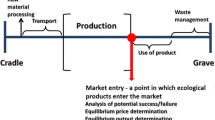Abstract
A well-designed and operated industrial ecological system should be able to utilize effectively the generated wastes from one member as the feed to another member. Nevertheless, due to heavy interactions among the member entities, particularly with various uncertainties, the coordinative material and energy reuse is a very complex task. In this paper, the issues of optimal operation of an industrial ecosystem under uncertainty are addressed. A game theory based approach is then introduced to derive an economically and environmentally optimal status of an industrial ecosystem. The effectiveness of the approach is demonstrated by tackling a case study problem, where the Nash Equilibrium for the profit payoff and sustainability payoff of the member entities is identified. The possible conflicts of the profit and sustainability objectives of the member entities in the ecosystem are resolved.



Similar content being viewed by others
References
Odum HT (1996) Environmental accounting. Wiley, New York, NY, USA
Sikdar S (2003) Sustainable development and sustainability metrics. AIChE J 49(8):2003
Heijungs R,. Huppes G (1996) Life cycle assessment. UNEP, Paris, France
El-Halwagi M, Noureldin M (2000) Pollution prevention targets through integrated design and operation. Comp Chem Eng 24(2–7):1445-1453
Brown MT, Herendeen RA (1996) Embodied energy analysis and emergy analysis: a comparative view. Ecological Economics 19:219–235
Ulgiati S, Brown MT (1998) Monitoring patterns of sustainability in natural and man-made ecosystems. Ecological Modeling, 108:23–26
Bakshi BR (2002) A thermodynamic framework for ecologically conscious process systems engineering. Comp Chem Eng 26(2):269–282
Yang H, Li YR, Shen JZ, Hu SY (2003) Evaluating waste treatment, recycle and reuse in industrial systems: an application of the emergy approach. Ecological Modelling 160:13–21
Myerson RB (1991) Game theory: analysis of conflict. Harvard University Press, Cambridge, MA, USA
Jorgensen S, Zaccour G (2001) Incentive equilibrium strategies and welfare allocation in a Dynamic game of pollution control. Automatica 37:29–36
Basar T, Oldser GJ (1982) Dynamic noncooperative game theory. Academic Press, New York, USA
McKelvey R,McLennan A, Turocy T(2000) Gambit: An interactive extensive form game program.California Institute of Technology, Pasadena, CA, USA
Acknowledgment
This project is in part supported by Gulf Coast Hazardous Substance Research Center, and NSF under grants DMI-0225844 and DMI-0225843.
Author information
Authors and Affiliations
Corresponding author
Rights and permissions
About this article
Cite this article
Lou, H.H., Kulkarni, M.A., Singh, A. et al. A game theory based approach for emergy analysis of industrial ecosystem under uncertainty. Clean Techn Environ Policy 6, 156–161 (2004). https://doi.org/10.1007/s10098-003-0235-6
Received:
Revised:
Accepted:
Published:
Issue Date:
DOI: https://doi.org/10.1007/s10098-003-0235-6




